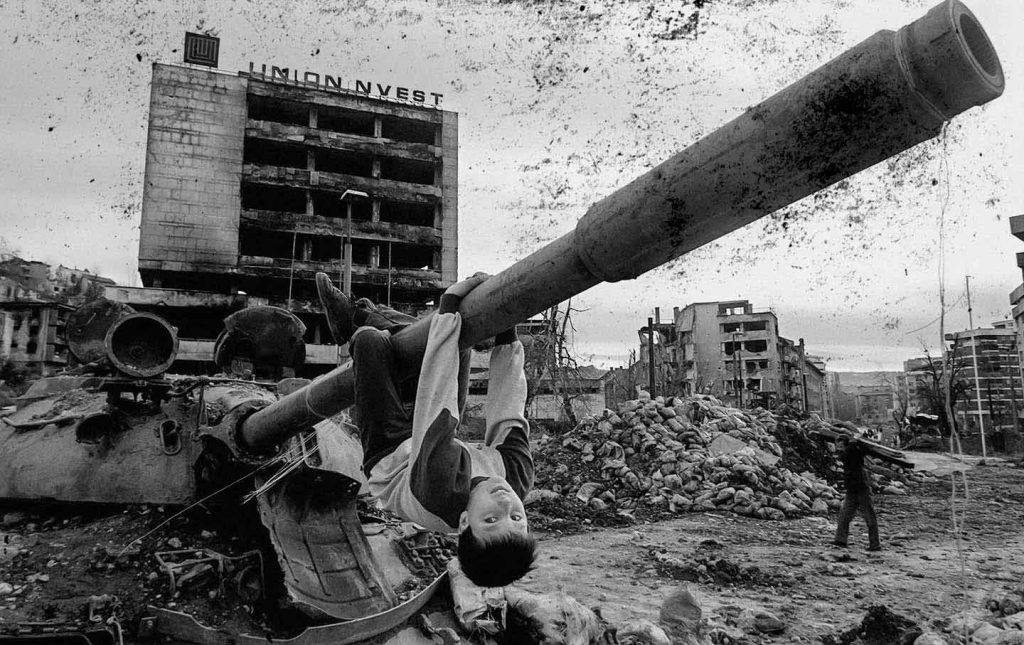A topsy-turvy peace: A boy plays among the ruins of war in the Grbavica neighborhood of Sarajevo in 1996. (Odd Andersen / AFP via Getty Images)
The Dayton Accords and privatization have kept Bosnia and Herzegovina in a tragic limbo.
By Carol Schaeffer
Just minutes after the polls closed on October 2, a German diplomat named Christian Schmidt changed the election laws of Bosnia and Herzegovina. He did so unilaterally and without public input, as he is empowered to do as the high representative for Bosnia and Herzegovina. The vote had been going smoothly; international election monitors reported that it was peaceful and lawful. Then Schmidt’s decision suddenly pushed the country into crisis.
For more than a year, Schmidt had been suggesting that he would rewrite the election rules to “promote the functionality” of the Federation of Bosnia and Herzegovina, one of the two constituencies that make up the country, along with the Republika Srpska. But he walked back those promises after protests of more than 7,000 people in Sarajevo over the summer. His decision to impose these laws was a surprise, and it has shaken the country’s already fragile faith in democracy.
This kind of intervention has been a feature of life in Bosnia and Herzegovina (referred to hereafter as Bosnia for simplicity) since the Bosnian War ended in 1995. Decades of international managerial involvement and billions of dollars in aid have created a unique case study of the effects of interventionist foreign policy and neoliberal economics. The result is that the country’s peace remains tenuous, and its politics are as deadlocked as ever.
The political scientist Jasmin Mujanović has called Bosnia’s political system “the most decentralized and complex constitutional regime in the world,” with a “Byzantine government apparatus staffed according to a rigid ethno-sectarian key.” This is a consequence of the Dayton accords, which ended the war by granting ethnically cleansed territory to those who had cleansed it and by proclaiming that Bosnia would be, as many Bosnian politicians have put it since, “one country of three nations.” The segregation encoded by the accords touches nearly every aspect of Bosnian life—not just politics but schools and other public services. In some ways, the peace agreement was extremely successful: It immediately ended a three-year conflict that left an estimated 100,000 dead and 2 million displaced, and there has been little interethnic violence since. But it didn’t spare the country from postwar economic stagnation and political chaos.
The Dayton-erected government structure is dizzying. In a country of just over 3 million inhabitants, there are two federal entities, the Republika Srpska and the Federation of Bosnia and Herzegovina; some 14 levels of governance; more than 100 political parties; 13 prime ministers, more than 180 ministers, and more than 700 members of parliament; 10 districts known as cantons, plus one autonomous district; and three coruling presidents, each of whom represents a constituent ethnicity: Serb, Croat, or Bosniak. All the other identities, including Roma, Jews, and anyone else who does not fit neatly into one of the three ethnic identities, are excluded from the presidency. With each election cycle, politics is increasingly entrenched along ethno-nationalist lines. All of this is presided over by a suite of international agencies, one of which is the Office of the High Representative, led by Schmidt, a former German agriculture minister. His UN-appointed role is to enforce the Dayton accords, and his sweeping powers allow him to change the Constitution, fire elected officials, and, as Bosnians have just learned, alter election laws before the votes are even counted.

